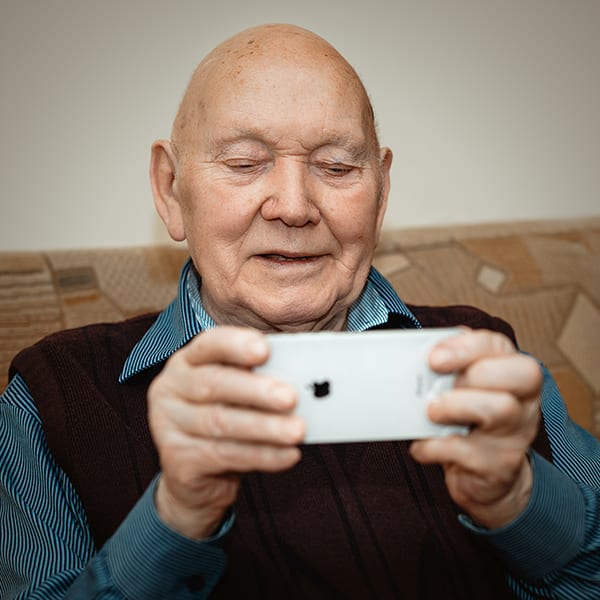With the outbreak of COVID-19, millions of Americans are dealing with loneliness from Social Distancing. While many people of younger generations are coping with video chats and other ways to stay social from home; many of our nation’s elderly are really feeling the effects of isolation. With COVID-19 being especially dangerous to the elderly, many families are taking precautions to ensure that they protect their older family members. While these precautions are necessary to ensure their safety, loneliness can also be a huge challenge for your elderly loved ones.
Flattening the Curve
While elderly loneliness is at an all time high, the reasons for it are justified. Those over 60 and those suffering from pre-existing conditions are at a higher risk from suffering more severe cases of coronavirus. Social distancing is key to flattening the curve of the disease’s infection rate. Keeping proper social distance (at least 6 feet), and the use of masks and gloves when interacting with others is vital to the safety of yourself and others. If you take care of an elderly individual, it is even more important that you take these precautions. These social distancing measures, however, can create a sense of loneliness for all, and especially the elderly, who are stuck at home now more than ever.
The Effects of Loneliness
Loneliness can be a distressing experience, especially for those of advanced age. Humans are social creatures, and loneliness can affect our mental, emotional, and even physical health. Studies have shown that periods of isolation and loneliness can raise the risk of Alzheimer’s disease, hypertension, and heart attacks. Loneliness can also be a huge factor in depression and anxiety.
Helping Your Loved Ones Cope
Many of us are coping with loneliness and isolation with access to our community online. However, if your loved one is technologically challenged, this can become a big challenge. Your loved one may not be able to operate a computer, let alone Skype or Zoom. If possible, help your loved one set up one of these applications to connect with family members. If they have a smartphone, apps like Google Hangouts or FaceTime can be helpful. These apps give them an opportunity to interact with friends and family virtually.
For loved ones that are techno-phobic, regular phone calls can provide your loved one with a safe connection to the outside world. Additionally, curbside visits can be a good way to fight off loneliness. Coordinate with other family members to schedule visits. Sitting outside their home, and talking to them through an open window can be a good way to provide fresh air and social interaction.
Alzheimer’s And Loneliness
Elderly individuals suffering from Alzheimer’s or Dementia can be suffering from increased loneliness and confusion. It can be incredibly difficult for your loved one to understand the gravity of the current global situation while suffering from Alzheimer’s. They may feel neglected during periods of increased isolation. While wearing masks may scare or confuse them, it is important to wear them in order to reduce the risk of spreading the virus to them. For more information on dementia caregiving during the COVID-19 outbreak, see our article on the subject, here.
Home Health Aides at Safe Harbor
Our certified home health aides are trained to take preventative measures, including social distancing, for the safety of your loved one. Our professional team is working to ensure that everyone under our care is well taken care of during this global health crisis. We are closely monitoring information as it comes out from vital medical sources, such as WHO and the CDC; and making sure that our home health aides are working in accordance with these safety regulations. This includes taking safety measures such as using Personal Protective Equipment (PPE).
Safe Harbor Healthcare Services does not provide medical or healthcare advice via articles. This material has been prepared for informational purposes only, and is not intended to provide, and should not be relied on for medical advice.
Safe Harbor Healthcare Services has been providing excellent home care on Staten Island since 1967. Our services help the elderly and disabled live safely and independently; while giving their families the peace of mind they need. For more information, contact Safe Harbor by clicking here, or call us at (718)-979-6900.
SafeHarbor is working 24 hours to continue providing safe and quality home care services during COVID-19. Let us know if we can help you during these difficult times. Information regarding the novel coronavirus is changing daily. For more up-to-date information, check the CDC and WHO websites.

